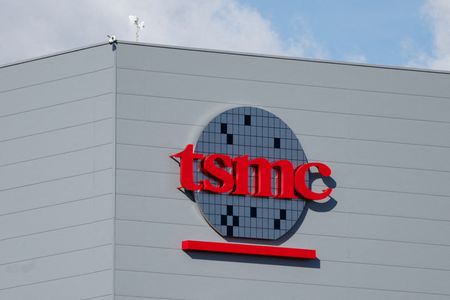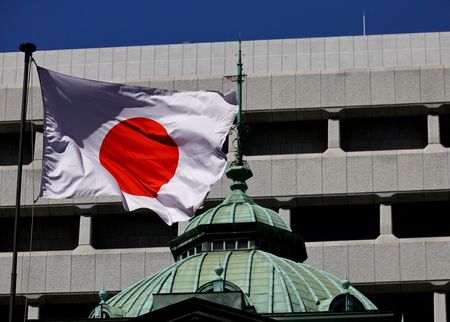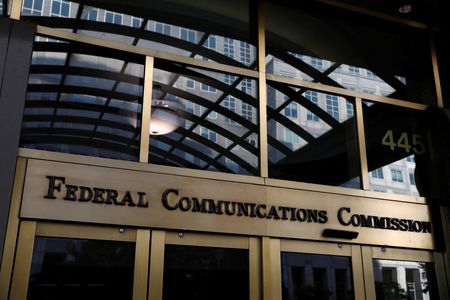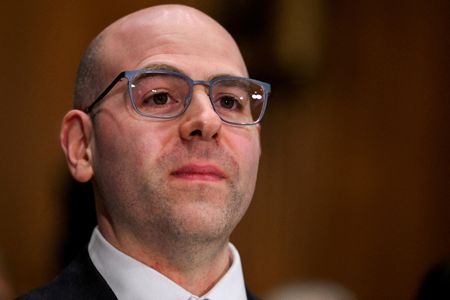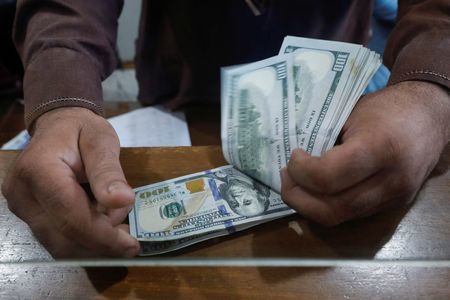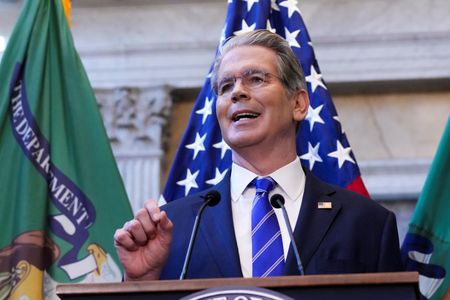By David Lawder and Andrea Shalal
WASHINGTON (Reuters) -Top U.S. officials on Wednesday blasted China’s major expansion of rare earth export controls as a threat to global supply chains, but said Beijing could still change course and avoid steps by Washington to decouple from the world’s second-largest economy.
U.S. Trade Representative Jamieson Greer told a press conference that China’s new export restrictions were a “global supply-chain power grab” and the U.S. and its allies would not accept the restrictions, but he and Treasury Secretary Scott Bessent stressed that Washington did not want to escalate the conflict, which has roiled financial markets and sent U.S.-China relations into a tailspin.
As of Tuesday night, U.S. President Donald Trump was still expecting to meet with Chinese President Xi Jinping in South Korea later this month, Bessent said.
Greer told reporters that China has not yet implemented the revised regulatory system for rare earths and could still back away, just as the U.S. had not implemented a retaliatory 100% increase in tariffs on Chinese imports.
“These are drafted, or in draft, so it’s quite real, but our expectation is that they won’t implement this and that we’ll be able to be back to where we were a week ago where we had the tariff levels we’ve agreed to and we have the flow of rare earths that we agreed to,” Greer said.
Neither official would discuss possible outcomes for negotiations aimed at averting the restrictions and U.S. retaliation, which includes a threat by Trump to increase tariffs on Chinese imports by an additional 100%.
The two sides have maintained lower tariffs and continued Chinese rare earth flows under a delicate, six-month truce that has been repeatedly extended for 90 days at a time but Bessent suggested a longer extension was possible.
“We are currently in a 90-day roll on the tariffs, so is it possible that we could go for a longer roll in return for a delay? Perhaps, but all that’s going to be negotiated in the coming weeks before the leaders meet in Korea,” he said.
TRADE WAR CLOUDS OUTLOOK
Their comments came hours after the U.S. and China rolled out tit-for-tat port fees on each other’s ships, opening a new front in their bitter trade fight.
Escalation of U.S.-China trade tensions overshadowed the International Monetary Fund and World Bank meetings in Washington. In its World Economic Outlook released on Tuesday, the IMF had upgraded its global growth forecast in part due to the superpowers’ recent detente.
Bessent said U.S. and Chinese officials were meeting on the sidelines of the IMF-World Bank gathering to arrange the Trump-Xi meeting, adding that it was the level of trust between the two leaders that had prevented escalation of the tariffs in the past.
Greer and Bessent, who have met personally with senior Chinese officials four times in four different European cities in recent months, called China’s actions, which threaten to upend global supply chains a “clear repudiation” of prior U.S.-China agreements.
UNRELIABLE SUPPLIER?
The U.S. does not want to economically decouple from China, but would have to take action if Beijing proved to be an unreliable supplier, Bessent said, noting that Chinese officials recently told U.S. auto companies that a slowdown in shipments of rare earth magnets was “probably something” to do with a holiday.
“Not only is China fueling Russia’s war (in Ukraine), but China’s actions have once again demonstrated the risk of being dependent on them, on rare earths and for that matter, anything,” Bessent said, adding, “If China wants to be an unreliable partner to the world, then the world will have to decouple.”
He said Washington had further measures it could deploy, including export controls, if Beijing proceeded, and was also ready to tariff China over its purchases of Russian oil, as long as European partners joined in. The U.S. has slapped additional tariffs on India over its smaller purchases of Russian oil, but has refrained for now from taking action against China.
Members of the Group of Seven advanced economies are expected to discuss the issue during a meeting later on Wednesday on the sidelines of the IMF-World Bank meetings.
“While there are substantial actions we can take, we’d rather not. I believe China’s open to discussion and I am optimistic that this can be de-escalated,” Bessent said.
The U.S. would also produce photographs supplied by the Ukrainian government that showed Chinese parts were used in Russian drones operating in Ukraine, Bessent said through a spokesperson.
Earlier on Wednesday, the Treasury secretary told a CNBC event that China had clearly intended to take action “all along,” rejecting Beijing’s claim that the actions were a response to U.S. actions, including the new U.S. port fees.
He told CNBC that a senior Chinese trade official had threatened as early as August to “unleash chaos on the global system” if the U.S. went ahead with the port fee increases.
Bessent named the official as Li Chenggang, China’s chief trade negotiator and a subordinate of Vice Premier He Lifeng, who has participated in all the U.S.-China talks.
(Reporting by David Lawder and Andrea Shalal; Editing by Andrea Ricci and Paul Simao)



